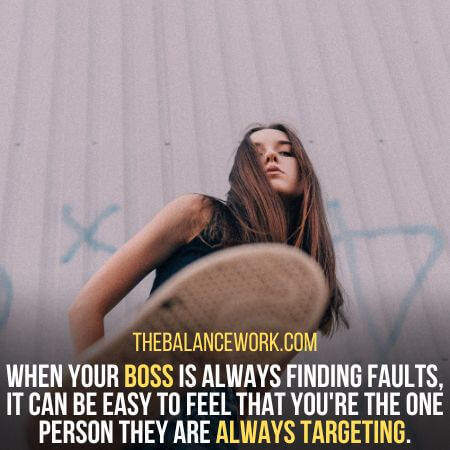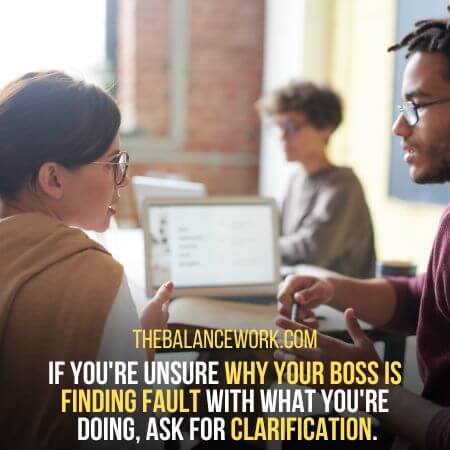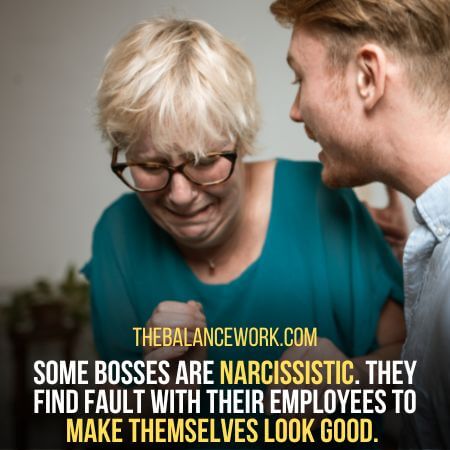Dealing with a nitpicking boss can be tough. Let’s learn smart ways to handle faultfinders in meetings.
Constant fault-finders at work can drain your motivation and make the job a drag.
Key Takeaways:
- Don’t take it personally. Your boss might just be naturally critical.
- Stay positive and professional. Don’t react emotionally. It won’t help.
- Ask for clarification if you’re unsure why your boss is criticizing you.
- Reflect on your work to see where you can improve.
- Ask questions to understand your boss’s expectations better.
- Stay focused on your work and ignore distractions.
- Avoid arguing with your boss. It won’t solve anything.
- Don’t compare yourself to others. Focus on your growth.
- Set boundaries to protect yourself from constant criticism.
- Keep a record of criticism for future reference.
- It might be time to quit if things don’t improve but do it respectfully.
16 Ways To Deal With A Boss Who Always Finds Fault
We often find ourselves stuck with such weird bosses. But worry not; we are here to support you.
Here are 16 ways to deal with such a demanding boss:
1. Try Not To Take It Personally:
When your boss constantly criticizes you, it might feel like you’re their main target. But remember, it’s not personal; your boss is critical.

Don’t take it personally to avoid feeling defensive. Instead, see it as constructive feedback.
Don’t waste energy on such childish behavior; it’s unproductive and won’t benefit you.
2. Stay Positive To Deal With A Boss Who Always Finds Fault:
Maintaining a positive attitude at work is crucial, regardless of your boss’s criticism.
Negativity hurts your image, and complaining makes your boss defensive.
A positive attitude shows you handle challenges well, making you a stronger asset to the team.
3. Don’t React Emotionally & Stay Calm:
If your boss often criticizes your work, it’s natural to feel defensive. Yet, reacting emotionally will only escalate the issue.
Stay calm and professional to handle the situation better. Being emotional might suggest immaturity and an inability to handle criticism.
Getting frustrated or angry won’t help. So stay focused and maintain a positive attitude.
4. Take Criticism Constructively:
Not all criticism is wrong – sometimes your boss may have a point, and it’s up to you to take the criticism.
Don’t react defensively. Instead, consider their feedback and make necessary changes.
Understanding their point of view is key to improvement. If you’re unsure why they’re nitpicking you, you won’t be able to improve.
5. Ask For Clarification To Deal With A Boss Who Always Finds Fault:
Ask for clarification if you’re unsure why your boss is finding fault with what you’re doing.

A clarification may help you understand the situation and make the necessary changes.
It will help you understand their expectations and show you’re willing to learn and improve.
6. Take Time To Reflect:
Knowing what you’re doing wrong can be challenging when your boss always finds fault.
In these situations, taking time to reflect on your work is helpful.
By taking the time to reflect, you’ll be able to identify your weaknesses and work on fixing them.
7. Ask Questions:
Ask questions if you’re unsure or don’t understand your boss’s instructions. This will clarify things and ensure you’re on the right track.
Ask about the task, project goals, or expectations. Understanding your boss’s vision helps you work better.
8. Stay Focused To Deal With A Boss Who Always Finds Fault:
When your boss criticizes you, it’s tempting to lose focus. But it’s crucial to stay on task and ignore distractions.
This ensures you stay dedicated and get your work done well.
Otherwise, your boss will find more faults in your work, which you don’t want. Stay reliable and focused to avoid this.
9. Avoid Arguing & Take A Break:
Disagreeing with your boss can escalate problems. It suggests you’re not open to listening and only want to defend yourself.
If your boss won’t budge, arguing won’t help.
When things get tense, take a break. Step outside, grab a coffee, or have some alone time.
Clearing your mind will rejuvenate you for a fresh perspective.
10. Don’t Compare Yourself To Others:
Comparing yourself to others isn’t helpful, especially if your boss is always critical. It makes you feel worse about yourself and your work.
Instead, concentrate on your strengths and weaknesses. Strive for self-improvement without worrying about others.
Comparing only leads to negativity and doesn’t aid your progress.
11. Seek Support To Deal With A Fault-Finder Boss:
If you’re having a tough time with your boss, talk it out with a trusted friend, family member, or coworker.

Their advice and support are key to dealing with your boss.
Pressure without support can lead to stress and tension.
It could hurt your work and make your boss see more areas for improvement.
12. Set Boundaries To Deal With A Boss Who Always Finds Fault:
It’s crucial to set boundaries if your boss keeps criticizing you. Let them know you won’t accept constant criticism and stick to your decision.
Boundaries maintain your dignity and sanity.
Without them, your boss will keep finding faults. Don’t let them take advantage of you. Stand up for yourself.
13. Keep A Record To Deal With A Boss Who Always Finds Fault:
Keeping a log of your boss’s criticisms can be useful. It helps you track their behavior and proves if you need to complain.
Your record can include their critiques, comments about you, and times of rudeness.
This evidence supports your case if needed.
14. Talk To Your Boss:
If you’re struggling with your boss, have a chat with them. Stay calm and respectful.
Your boss might not realize they’re stressing you out, so they could be open to finding a solution.
Be professional yet approachable, and let them know you’re fully on board.
15. Get Feedback To Deal With A Boss Who Always Finds Fault:
It’s a good idea to get feedback from your boss, mainly if you struggle to deal with their criticism.
Ask what they expect and how you can improve.
This helps you understand their expectations and enhances your performance. It can also mend your relationship with them.
16. Quit:
If stress and criticism at work are overwhelming, consider quitting.

Talk to your boss first to find a solution, but moving on is okay if it doesn’t help.
Quitting may not be easy, but it could be the right choice. If possible, leave on good terms.
Why A Boss Always Finds Fault
There can be many reasons why a boss always finds fault. Here are some of the most common ones:
1. They’re Perfectionists:
Some bosses are perfectionists, expecting everything to be perfect. It can be very difficult for employees, as it’s impossible to meet their high standards.
Perfectionist bosses have super high standards that are impossible to meet. They’re critical, making you feel like you’re always failing.
Mistakes are bad, and creativity suffers because they focus on finding flaws.
2. They’re Angry:
Your boss is always grumpy and often yells, making you feel bad about your work. They never seem happy, even when you do well.
Don’t let them bring you down. If they go too far, speak up for yourself.
3. They’re Busy & Overworked:
A busy boss will often find fault with their employees to try and save time. They don’t have time to review work in detail, so they’ll look for mistakes.
They are overloaded and cranky, leading to high demands and long hours for you.
4. They’re Unhappy:
Unhappy bosses lash out at employees, making them miserable.

They do this because unhappy bosses need to feel better, and they do that by bringing others down.
Avoid these bosses – they’ll only make your work life worse.
5. They’re Jealous Or Insecure:
Bosses can get jealous and try to hold you back by nitpicking your work. This is because they feel insecure and threatened by your skills or new ideas.
It can be demoralizing, but focus on doing your best and keep your records in case you need them.
6. They’re Narcissistic:
Some bosses are narcissistic. They criticize to feel superior, hurting employees’ morale and the company.

This can lead to unhappy, unproductive workers who may even quit, costing the business.
Conclusion:
Having a boss who constantly criticizes can be tough, but you can manage it. Stay cool and handle criticism professionally.
If it gets overwhelming, talk to your boss or get help. If you choose to leave, do it respectfully.
Last Updated on 2 months by Usama Ali
- Why Does My Boss Wink At Me? 6 Potential Reasons - October 5, 2023
- Is It Legal For Your Employer To Call Your Doctor? No, But… - October 4, 2023
- 12 Ways To Deal With A Low IQ Person - September 22, 2023